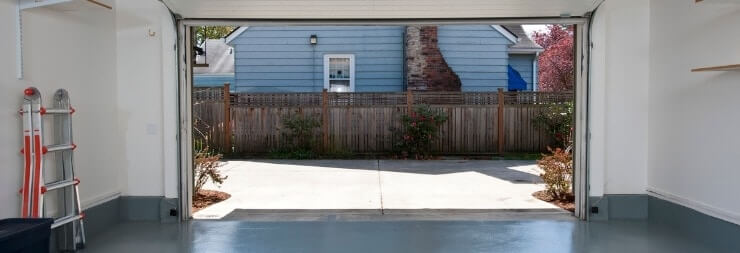For some people, a garage is a purely utilitarian space. It’s a place fit to store junk and park cars, but nothing else. For others, it is a veritable playground — a place to work on the old hot rod, throw darts, play pool, or pump iron. Whether you’re spending five minutes or five hours in the garage, however, a hot and humid room can be a truly miserable place. Moreover, high indoor humidity levels can contribute to the growth of mold and mildew, causing the air you breathe to be both unsafe and unpleasant. But what causes a garage to be so humid? And what can you do to fix it?
Why Are Garages So Humid?
To understand why garages are so prone to humidity, first we need to understand humidity itself. Humidity describes the amount of water vapor particles present in the air. Furthermore, when warm air collides with cooler surfaces, it releases these water droplets, often creating condensation. In rooms where the temperature changes so frequently — such as laundry rooms, storage closets, or basements — this collision of warm and cold happens more often, creating humid conditions.
Now, think back to your garage. You’re constantly raising the doors, letting cold air out and warm air in. Warm vehicles are pulled in and out on a daily basis. If you have a refrigerator or other appliances in your garage, these, too, add to the varying temperature inside the space. All of these factors make the garage a prime locale for high humidity levels. While humidity on its own might be bearable for many people, it can also lead to the growth of mold and mildew, both of which love warm, moist conditions. These fungi can be dangerous to the health of both your home and those who live inside it.
7 Ways to Reduce Humidity in Your Garage
1. Install Air Conditioner
Installing an AC unit for your garage will help keep its temperature steady, avoiding those fluctuations of warm and cold air that creates high humidity levels. An added benefit, of course, is that an AC unit in your garage will make it a more comfortable place to be — whether you’re an avid hobbyist or just looking to enter your car without a pool of sweat developing around you.
Modern AC units also dehumidify the air as a natural byproduct of their function. As it turns warm out to cooler air, it also condenses moisture from the air and sends it away via its drainage system. While dehumidification is an effect of air conditioning, it is not as effective as having a dedicated dehumidifier.
2. Get a Dehumidifier
Like AC units, dehumidifiers work by condensing moisture in the warm air and passing it across cooler coils, creating a liquid that it then removes through a drain pipe or stores in its water tank. It differs from an AC unit, however, in that its primary function is to remove moisture from the air, making it a much more efficient system for dehumidification. Using an AC unit in tandem with a dehumidifier will be even more efficient for controlling the climate and moisture of your garage — of course, if you’re not very concerned about the temperature, a dehumidifier alone will probably be enough to handle the job. Just be sure to get the right size unit for your space.
3. Install & Improve Garage Ventilation
Another way to reduce the humidity in your garage is to improve the current ventilation. Some common methods to improve garage ventilation include:
- Windows and doors. Opening windows and doors is an easy way to increase the airflow in your garage and release moisture in the air that may be trapped in your garage.
- Installing a ceiling fan. Running a ceiling fan in your garage can keep the air circulating and keep condensation from settling on surfaces.
- Installing an exhaust fan. These fans are generally installed on the roof or on an exterior wall and work by blowing air out of the garage. Not only will they keep warm, moist air from stagnating in your garage, they will also drive out bad odors that develop from common items stored in the garage, such as trash cans and vehicles.
4. Clean Your Garage
Simple as it may seem, keeping your garage clean is key to keeping the humidity down. Clutter in your garage can restrict airflow, allowing moisture to settle in the air and on surfaces more easily. Even if you have devices such as an AC unit or dehumidifier installed, they won’t work at their maximum capacity if the airflow is being hindered.
Keeping your garage humidity down also means getting rid of your cardboard. While many of us are accumulating more boxes than ever during quarantine, cardboard is a ripe home for mold and mildew growth and should be eliminated as soon as possible from your garage.
5. Apply Garage Floor Coating
Bare concrete flooring allows water to seep in and out, making it difficult to regulate moisture levels in the room. Concrete is also often cool, meaning that it can sweat when warm air comes in contact with it. Therefore, applying a water-resistant floor coating can keep unwanted moisture from entering your garage and help you keep the humidity level down.
6. Remove or Replace Your Extra Refrigerator
Having a deep freeze or an extra refrigerator can be a great benefit of any garage, but if the room isn’t climate controlled, your appliance is working overtime to keep its contents cool. Not only is this inefficient for your energy bill, it also creates condensation on and around the appliances themselves, which makes for a more humid garage. If you plan to continue using refrigerators or freezers in your garage, you should heavily consider adding an AC unit and taking other precautions to control the climate. If your appliances are older, it would also be a good idea to replace them for newer machines that work more efficiently and have better moisture seals to reduce how often hot and cold air are mixing.
7. Keep Your Space Dry
If it’s not clear already, any standing water can drastically affect the humidity levels in an indoor space. Therefore it is extremely important to keep your garage dry. This can mean anything from cleaning up after a spilled bottle of water to wiping your car or the floor down after it rains. Any puddling or moisture buildup can cause problems down the road if it isn’t handled in a timely manner.
AC Service in Brevard County
Our experienced team of technicians can assist with any of your air-conditioning needs. Whether it’s AC & Heating, Water Heaters, or HVAC maintenance & repair, we are here to help. Call us if you need assistance ASAP, or to schedule routine HVAC maintenance.
24-HR Emergency Service: (321) 269-4565







Leave a Reply